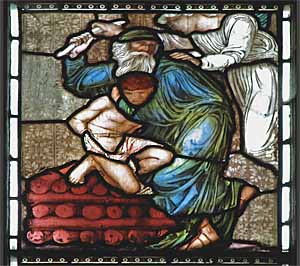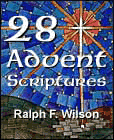
|
Old Testament
New Testament
Gospels
Acts
Paul's Letters
General Letters
Revelation
Topical Studies
Beginning the Journey (for new Christians). en Español

|
Old Testament
New Testament
Gospels
Acts
Paul's Letters
General Letters
Revelation
Topical Studies

|
Home
Bible Studies
Articles
Books
Podcasts
Search
Menu
Donate
About Us
Contact Us
FAQ
Sitemap
Day 4. The Seed and the Sacrifice (Genesis 22:8, 18)
Wednesday, First Week of Advent
 Edward Burne-Jones, 'The Binding of Isaac' (c. 1867-78), Jesus College Chapel, Cambridge, by Morris & Company. |
Reading: Genesis 22:1-18.
Abraham is elderly. His aging wife has been barren from the earliest days of their marriage in faraway Ur. But in his old age God has given them a son -- Isaac. What an amazing blessing! But then God calls on him to sacrifice his son, his only son.
God Will Provide the Lamb (Genesis 22:2-14)
"Take your son, your only son Isaac, whom you
love, and go to the land of Moriah, and offer him there
as a burnt offering on one of the mountains
of which I shall tell you." (Genesis 22:2)
Abraham is devastated. Nevertheless, the next morning he saddles his donkey and heads for Mount Moriah (now the temple mount in Jerusalem). He and Isaac climb, the boy carrying the wood for the sacrifice. The boy asks what is happening. The father replies, tears coursing down his cheeks:
"God will provide for himself the lamb for a burnt offering, my son." (Genesis 22:8)
Abraham binds the boy and places him upon the altar. Still believing God, Abraham begins to lower the knife to slay Isaac, but an angel stops him. You know the story.
Abraham's faith is amazing, believing God's promise to him that his descendants will be as many as the stars in the sky. The writer of Hebrews says,
"He considered that God was able even to raise him from the dead, from which, figuratively speaking, he did receive him back." (Hebrews 11:19)
Through Your Seed All Nations Will be Blessed (Genesis 22:16-18)
The angel now speaks out God's message and extends Yahweh's promise to Abraham and to us all.
"16 I swear by myself, declares the LORD, that because you have done this and have not withheld your son, your only son, 17 I will surely bless you and make your descendants as numerous as the stars in the sky and as the sand on the seashore. Your descendants will take possession of the cities of their enemies, 18 and through your offspring all nations on earth will be blessed, because you have obeyed me." (Genesis 22:16-18, NIV)
God reiterates his promise of multitudes of descendants. Twice in verse 17 and once in verse 18 we see the Hebrew noun zeraʿ, variously translated "descendants" (NIV, NJB), "offspring" (ESV, NRSV), "seed" (KJV, NASB). Grammatically, the word is always the singular in Hebrew, never the plural. It is a collective noun, where the singular also can be used as the plural. For example, in English we have one "deer" and a herd of "deer." We never have "deers." Just so, the singular collective "seed" here can refer to many offspring.21
The Seed is Christ (Galatians 3:16)
Paul makes an interesting observation when he comments on this passage in Galatians 3. He seizes on the singular "seed" as a reference to Jesus.
"The promises were spoken to Abraham and to his seed. The Scripture does not say 'and to seeds,' meaning many people, but 'and to your seed,' meaning one person, who is Christ." (Galatians 3:16)
Paul isn't ignorant; he knows Hebrew grammar backwards and forwards, but he interprets the passage as one who is trained in Rabbinical studies might. Like many a preacher, he stretches a bit to make a point. Paul's insight is right on target!
The promise is not that the world will be blessed by many Jewish doctors and scientists and statesmen, though that has come to pass, and thank God for them!
Rather, we know in hindsight that Jesus is The Seed, The Descendant of Abraham through whom this blessing gushes to the nations.22 The distinguished Jews who have blessed our world might be considered a refreshing stream, but the blessings that come through Jesus are like a mighty river at flood season. He blesses with a capital B. And we Gentiles (and I speak for most of my readers) become Abraham's blessed descendants because of our association, our oneness with, our connection by faith to Christ, the Ultimate Descendant through whom the blessings flow.
"If you belong to Christ, then you are Abraham's seed, and heirs according to the promise." (Galatians 3:29)
The Doxology, a famous praise chorus sung by the Church through the ages begins:
"Praise God from Whom all blessings flow...."
 Also available in book formats: PDF, Kindle, and paperback. |
Those blessings are channeled through God's only Begotten Son -- Jesus -- the Seed of Abraham who was willing to offer his only begotten son -- Isaac. And they are channeled through the Lamb of God, God's only Son given for us.
Jesus, born to poor parents in a bare stable on Christmas morn, is Abraham's seed, the One through whom abundant blessings have ever since flowed to the nations, to all who have put their faith in him -- Jesus, our Savior and soon-coming King!
Prayer
Father, thank you for Abraham's faith to offer his only son Isaac. Thank you for your great love in offering your only Son Jesus, the offspring and Seed of Abraham. We marvel at your goodness to us. In Jesus' name, we pray. Amen.
Discussion Question
Q4. (Genesis 22:16-18; Galatians 3:16, 29) To whom are
blessings promised through Abraham's descendant? In what way does Abraham's
sacrifice of Isaac prefigure the Father's sacrifice of Jesus?
https://www.joyfulheart.com/forums/topic/2078-q4-abraham/
Endnotes
[21] The noun zeraʿ means "sowing, seed, offspring." The noun's meaning falls into four basic semantic categories: (1) the time of sowing, seedtime; (2) the seed as that which is scattered or as the product of what is sown; (3) the seed as semen; and (4) the seed as the offspring in the promised line of Abraham, Isaac, and Jacob or in other groups separate from this people of promise. Kaiser notes, "Commencing with Genesis 3:15, the word "seed" is regularly used as a collective noun in the singular (never plural). This technical term is an important aspect of the promise doctrine, for Hebrew never uses the plural of this root to refer to "posterity" or "offspring" (Walter C. Kaiser, TWOT #582a).
[22] "Nations" here is the plural of gôy, that is the gôyim of the earth. Gôy means "Gentile, heathen, nation, people." Usually gôyim refers to nations, especially the surrounding pagan nations (Gerard Van Groningen, TWOT #326e).
Copyright © 2026, Ralph F. Wilson. <pastor![]() joyfulheart.com> All rights reserved. A single copy of this article is free. Do not put this on a website. See legal, copyright, and reprint information.
joyfulheart.com> All rights reserved. A single copy of this article is free. Do not put this on a website. See legal, copyright, and reprint information.

